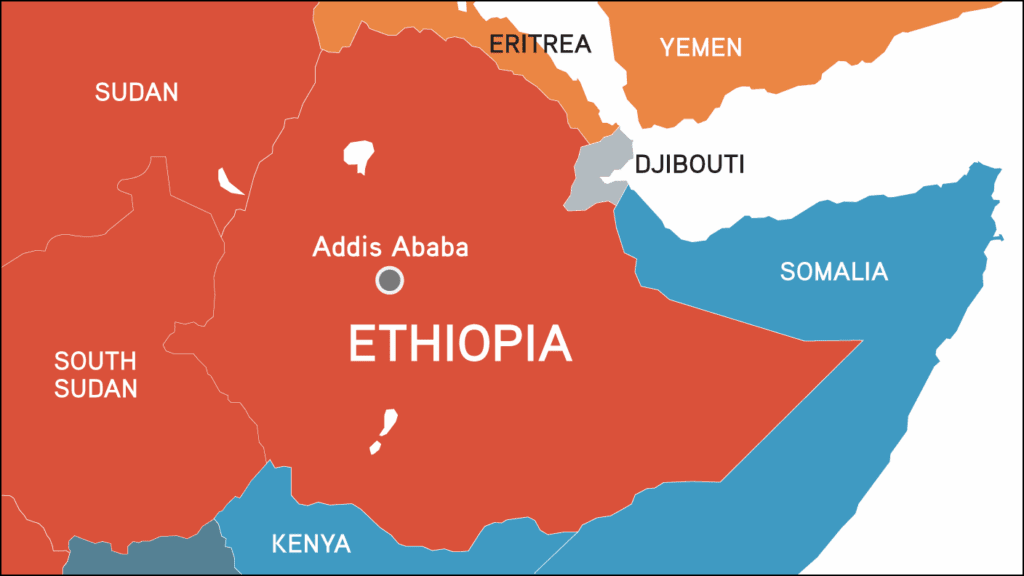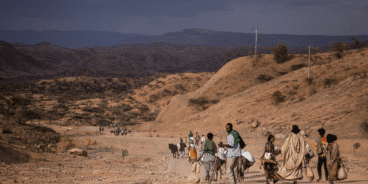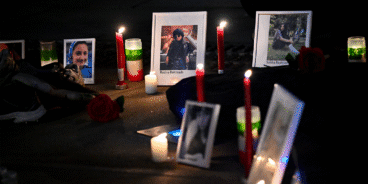Ethiopia

Populations across Ethiopia continue to be at risk of possible atrocities due to clashes between armed groups and government forces, as well as inter-communal violence. Populations in the Tigray region continue to endure war crimes and crimes against humanity despite a peace agreement.
BACKGROUND:
Long-standing grievances and recurrent human rights abuses by government forces and armed groups in Ethiopia have caused multiple conflicts to flare since Prime Minister Abiy Ahmed rose to power in 2018. Hundreds of thousands of civilians have been killed, particularly in the Amhara, Oromia and Tigray regions, and over 3.3 million people remain displaced. Inter-communal and inter-religious violence, as well as regional border disputes, also continue. Conflict and climate factors have driven a massive humanitarian crisis, leaving 21.4 million people in need of assistance.
Since 2018 conflict between Oromia regional security forces, the Ethiopian National Defense Forces (ENDF) and the Oromo Liberation Army (OLA) armed group have killed thousands of civilians, with parties perpetrating violations and abuses that may amount to war crimes and crimes against humanity. Despite a December 2024 peace agreement signed by the federal government and an OLA faction, government forces continue to commit enforced disappearances and attacks on civilians, including through air and drone strikes and extrajudicial executions of perceived OLA supporters. The OLA, which seeks autonomy for ethnic Oromos, has targeted ethnic Amharas living in Oromia and border areas.
From November 2020 to 2022, the ENDF and its allies, including the Eritrean Defense Forces (EDF), fought the Tigray Defense Forces (TDF). The hostilities, which initially began in Tigray, later spread to the neighboring Afar and Amhara regions. War crimes and/or crimes against humanity were committed by all parties to the conflict, with the Tigrayan population enduring the highest levels of violence. This includes mass sexual violence largely through rape and gang rape by armed groups. Several UN bodies, including the International Commission of Human Rights Experts on Ethiopia (ICHREE), and rights groups documented indiscriminate bombings, ethnic killings, forced displacement and destruction of cultural heritage and vital infrastructure. Amnesty International and Human Rights Watch also reported that Eritrean and Amhara forces, with ENDF complicity, carried out the ethnic cleansing of Tigrayans in Western Tigray.
Although the federal government and the regional governing body, the Tigray People’s Liberation Front (TPLF), signed a cessation of hostilities agreement (CoHA) on 2 November 2022, abuses by the EDF and Fano, an ethnic Amhara militia, have continued in Tigray, including sexual violence and extrajudicial killings of civilians. The regional administration estimates that around 40 percent of Tigray remains occupied, including by the EDF and Amhara forces in the west.
Since April 2023 the ENDF and Fano forces have been engaged in clashes in and around civilian areas. The UN and international rights groups have documented abuses by federal forces, including mass arrests, drone strikes on civilians and attacks on health facilities.
While national efforts toward accountability have been minimal, other justice initiatives have progressed. In May the African Commission on Human and Peoples’ Rights heard a case brought by Legal Action Worldwide (LAW) and its partners, accusing the Ethiopian government of ongoing violations in Tigray. LAW also filed a universal jurisdiction complaint in Germany against Ethiopian and Eritrean officials for war crimes and crimes against humanity. Separately, in Kenya, Amnesty International is leading a $2 billion reparations case against Meta for failing to remove hate speech that incited killings.
Since 2024 the TPLF has fractured, mainly between a faction loyal to longtime chairman Debretsion Gebremichael (TPLF-D) and another aligned with former deputy Getachew Reda. The TPLF-D has reportedly established parallel local administrations and seized towns, undermining the Interim Administration’s authority. The split is further complicated by Eritrea’s involvement and the TPLF-D’s alleged ties to the Eritrean government.
RECENT DEVELOPMENTS:
In recent months, new evidence has emerged of sexual, reproductive and gender-based violence during the conflict in Tigray, Afar and Amhara. A 31 July report by Physicians for Human Rights and the Organization for Justice and Accountability in the Horn of Africa documents extensive and targeted rape, forced impregnation, invasive injuries and threats to destroy fertility as tools of ethnic persecution, particularly against Tigrayan women. On 16 October the Commission of Inquiry on the Tigray Genocide, an investigative body established by the regional government, determined that the sexual and gender-based violence committed during the war amounted to genocide, crimes against humanity and war crimes. Based on a survey of over 480,000 people, the Commission found that 59 percent of respondents experienced gender-based violence, with over half reporting rape, often gang-rape. Survivors described enslavement, mutilation and sexual assault with foreign objects, with some burned or killed during attacks by the ENDF and EDF.
Violence in Oromia has escalated since the end of July, with the OLA launching its largest offensive in months. In Amhara, Fano militias significantly escalated attacks in North and South Wollo during September. At least 25 civilians were killed and thousands displaced during a Fano attack on Hoomaa Gaalessaa village in Oromia region.
ANALYSIS:
In Amhara and Oromia, civilians are facing atrocities due to fighting between ethnic militias and the federal government’s retaliation against local communities. Amharas in Oromia and Oromos in Amhara, as well as those along the regional borders, are vulnerable to attacks by ethnic militias. Identity-based killings and targeted attacks on civilians and civilian infrastructure violate International Humanitarian Law (IHL) and International Human Rights Law (IHRL) and may amount to crimes against humanity and war crimes.
Populations in Tigray, Afar and Amhara remain at risk of war crimes and crimes against humanity amid violations of the CoHA. Disputes over Western Tigray and other territories heighten risks of conflict between Amhara and Tigrayan groups. The continued presence of the EDF, combined with the TPLF’s internal divisions, has heightened fears of renewed conflict between TPLF factions and the federal government, and between Eritrea and Ethiopia.
A history of impunity and lack of effective transitional justice for human rights abuses perpetrated under successive ruling parties has exacerbated grievances. ICHREE, the only international body monitoring the situation in Ethiopia was terminated in October 2023 despite it issuing multiples warnings of ongoing and future atrocity risks. Victims and survivors of the most recent violence called for the country’s Transitional Justice Policy to include international elements; however, these calls were not heeded, reducing trust in the domestic accountability process. The targeting of human rights organizations, defenders and the press further erodes trust in institutions and the rule of law. Given ongoing conflicts, it is imperative for all parties to pursue conflict resolution tracks before implementing transitional justice initiatives to allow for a holistic, inclusive and long-lasting process.
RISK ASSESSMENT:
-
-
- Ongoing tensions threatening the fragile peace process in Tigray and neighboring regions.
- Policy or practice of impunity for – or tolerance of – serious violations of IHL and IHRL, atrocity crimes or their incitement.
- Unresolved inter-communal tensions in conflict-affected areas and the ENDF’s attacks on associated ethnic-based militias.
- Inflammatory rhetoric, propaganda campaigns or hate speech by political figures to capitalize on the politicization of ethnic identity.
- Lack of trust and confidence in state institutions to resolve conflicts and implement transitional justice initiatives.
-
NECESSARY ACTION:
Government forces must comply with international law, prioritize civilian protection and transparently investigate alleged abuses to ensure accountability and restore trust with victims and affected populations. Armed groups must end the targeting of civilians.
While meaningful steps have been taken to implement the CoHA and enable the unfettered delivery of aid, the process must continue in good faith, with urgent progress needed on transitional justice and the return of displaced persons. The EDF should immediately withdraw from Ethiopia. The federal government, regional authorities in Tigray and Eritrean authorities must deescalate tensions to prevent renewed conflict.
Due to the lack of confidence in domestic accountability measures, the international community should explore alternative options, including through universal jurisdiction. The federal government should work with UN Special Procedures and other experts on transitional justice to ensure processes meet international standards.
For more on the Global Centre’s advocacy work on the situation in Ethiopia, see our Ethiopia country advocacy page.
Atrocity Alert No. 461: Israel and the Occupied Palestinian Territory, Global Landmine Report and Ethiopia
Related Content

Ethiopia on the Brink: International community must act urgently to prevent mass atrocities

Atrocity Alert No. 468: Iran, Ethiopia and Afghanistan
